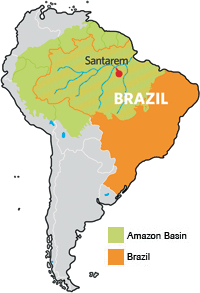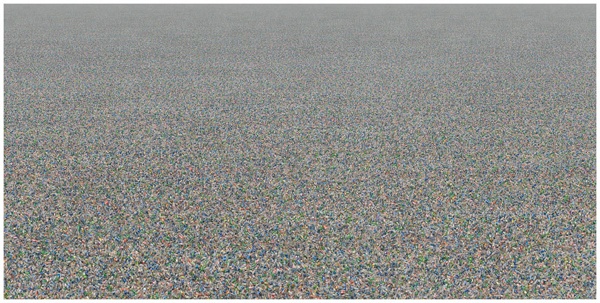
Let me say upfront that i am a lapsed vegetarian: i am a meat opportunist. If the choice is between me and starvation - or me and no protein source at all - i'll eat that asphyxiated, air-bolted, or otherwise slaughtered creature. I will try to excuse myself by limiting my intake to grass fed cattle, free range, cage free birds and line caught fish.
Just wanted to get that on the table before offering the following for your meat-eating consideration: as if meat production wasn't costly enough, EU cows are contributing to the destruction of the rain forest. Once again when it comes to deforestation at a distanceand the forcible removal of people from their homes, fast food outlets in the EU are at the head of the cue. THis time, it's not because they're selling Amazonian Beef, but because the food the cattle eat is based on soybeans grown where people and old growth forests used to be:
(quote)Fast-food outlets throughout Europe, including McDonald’s, rely heavily on Brazilian soybeans, which are increasingly harvested from fields that used to be Amazon rainforest. The European Union bought 10 million tons of soy from Brazil in 2006 — about 40 percent of Brazil’s soy export crop — soy that is used as animal feed to fatten the cows and chickens that become Big Macs and McNuggets. (Nearly 80 percent of the global soybean harvest is milled into animal feed, according to the Worldwatch Institute.)(end of quote)
 If you care about why getting rid of old growth sources of our planet's ecosystems, and CO2 cleansing planetary lungs, is an issue; if you care about the environmental impact of Big Meat; if the costs of production socially, economically and globally of Meat are of interest, then you now have one more question to ask at the grocery store if you purchase EU-based meat products: what did those poor suckers eat before they ended up on the chop?
If you care about why getting rid of old growth sources of our planet's ecosystems, and CO2 cleansing planetary lungs, is an issue; if you care about the environmental impact of Big Meat; if the costs of production socially, economically and globally of Meat are of interest, then you now have one more question to ask at the grocery store if you purchase EU-based meat products: what did those poor suckers eat before they ended up on the chop?
Technorati Tags: environment, health, meat
It seems an awful lot of them have been eating GM'd AND non-GM'd soybeans alike grown where once old growth brazilian rain forest existed. This state of affairs is problematic for a number of reasons, but one of them at least is that the cost of that burger, stake or sausage may be significantly higher and have more global consequences than that with which a reasonable person may reasonably be expected to cope.
And yet we have so much choice in our affluence as a nation: once we're informed about problems, we have a capacity to chose. Less meat, less meat frequency; and if it is consumed, get local. Local raised, transported and now, FED with LOCALLY grown FEED. One might smile knowingly and say Ah but in the UK major grocery merchants have cut out GM feed from their products. Uh huh, we'll leave the current issue du gare of contamination between gmo and non-gmo crops aside for the moment. That still leaves soybeans that aren't GM'd - and where do they come from? Brazil. Who's the biggest importer of brazilian soybeans for livestock feed? the EU.
Once upon a time, McDonalds was chided because it was supposedly buying beef from cattle grazed on what was once old growth brazilian rain forest. As recently as 2005, the EU was importing this beef out of fear of mad cow disease. Market forces. Those forces turned ugly, turning the poorer people on that land (aka "peasants") off it by force so it could be given over to the more cost-effective cattle. When a nun was killed protesting these actions, public sentiment started to turn against government sanctioned practice. The obligatory "conservation" areas were set up.
It's tragically ironic that while EU beef products are largely back on the table, what feeds them is still more of the rainforest: soybeans grown on oldgrowth land. The UK is part of the EU, and UK cattle do chow down on non-GMO brazilian rain forest soybeans.
Large international feed companies like Carghill are now involved in efforts to work with Brazilian farmers and government on rainforest reforestation projects as many illegal soybean farms turn "legal" - and companies like cargill (though they aren't the only companies in the region) are buying less soy from the region because it is not in compliance with new "Forest friendly" regulations about soy production.
The question UK consumers - like you reading this - can start asking when going up to the butcher's shelf in the grocery is "what's the source of feed for the chickens here? for the cows?" and if they say soybeans, "are the sources certified as "forest friendly"
Now if you're a meat eater, you may want to ask yourself how great an idea is even forest friendly soybean feed? First there's the questionable practice of "reforestation" - i admit i haven't investigated what that means in the Amazon, but back home in canada, it meant monoculture: planting a single type of tree in straight rows in order to be harvested later again. That's not a forest; that's a farm.
Second, let's look at the cost of shipping that feed in for EU cattle. Food is grown in one country half way around the world; that heavy produce is then put into various transports and shipped non-stop across the planet to feed EU livestock (livestock. what a word). Transportation costs alone in terms of fuel are non-trivial. Add that to the energy cost of raising animals for food, and ya have to ask what fast food joints are doing to the food to make it profitable.
and THIRD - what is perhaps the most ironic point - may be in the following basic question (maybe it's not basic if you haven't spent any of your life around a farm or farm animals) Why does food need to be shipped in for cattle in the first place? if there's not enough room to graze the cattle, where are the cattle being kept? In little boxes? YES. Standing still in stalls. And that's OK? How artificial is that?
ALL this - ALL this grief death and destruction (no exaggeration that, eh?) for what? the fast food burger or nugget we grab and consume without thinking (and then feel like crap five minutes later); the cheap cut of meat whose source or provenance is not posted or queried? and this is good? this is something educated persons can rationalize as fine, if not good?
And before anyone pulls out "but i'm a student; i can only afford the cheap meat" there are alternatives, including "eat less; eat local" That also means avoiding the fast food lunch with chicken or meat from unknown sources. Go ahead: next time you pop into your fave food shop, ask where they get their chicken or beef.
That is, if we want to keep eating meat, we can eat less of it. That's the advice of economist Rajendra Pachauri offers in an arrgument that explains how this action alone will have significant benefits for the environment, too.
And when we do eat mean, we can ensure its local, its pastures are local - that it has pastures, and that it has some level of care that we would take pride in being scrutinized by the world (growing no. of uk examples, like "happy meats" (!)). If we start seeing meat as the high cost luxury good it is, we might value it a bit more, too.
Or we can just stop eating meat.
Lots of choices. One step at a time.


 If you care about why getting rid of old growth sources of our planet's ecosystems, and CO2 cleansing planetary lungs, is an issue; if you care about
If you care about why getting rid of old growth sources of our planet's ecosystems, and CO2 cleansing planetary lungs, is an issue; if you care about